
- Home Page
- Accepted
Paintings & Copies - Doubtful
Attributions - Doubtful Textual References
- Alternative
Titles - Collectors &
Museums - Bibliography
- Search Abecedario
- Watteau &
His Circle
Bon voyage (copy 1)
Entered July 2016; revised March 2017

Whereabouts unknown
Materials unknown
Measurements unknown
ALTERNATIVE TITLES
La Déclaration d’amour
PROVENANCE
Paris, collection of Casimir Périer (1777-1832; banker and president of the Chamber of Deputies); his sale, Paris, April 18-21, 1838, lot 62: “WATTEAU . . . La déclaration d’amour. Charmant épisode du beau tableau dit le voyage à Cythère; l’esprit et la finesse de la touche, le coloris brillant, font de ce précieux échantillon une des meilleurs productions du maître; avis aux amateurs qui savent combien il est difficile d’en rencontrer, surtout d’aussi bien conservés.” Sold for 600 francs.
Paris, collection of Alfred Boucher (1850-1934; sculptor).
SELECT BIBLIOGRAPHY
Dacier, Vuaflart, and Hérold, Jean de Jullienne et les graveurs (1921-29), cat. 35.
Réau, “Watteau” (1928), cat. 154.
Adhémar, Watteau (1950), under cat. 193.
Macchia and Montagni, L’opera completa di Watteau (1968), cat. 177.
Ferré, Watteau (1972), cat. B46.
REMARKS
Dacier, Vuaflart, and Hérold, as well as Réau, thought that the version then in the Boucher collection was the original by Watteau, but Adhémar dismissed it as merely a replica. As always, her opinion was mimicked by Macchia and Montagni. There seems to be no available image of this painting. That, coupled with the lack of description and measurements, makes it impossible to determine whether it was the original from Watteau’s hand, unlikely as it may be, or a copy. Similarly, there is no way of knowing whether Alfred Boucher’s painting was the one that then entered the Bliss collection (our copy 3).
Bon voyage (copy 2)
VOID
Bon voyage (copy 3)
Entered July 2016; revised March 2017
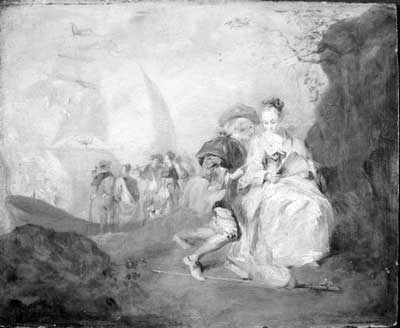
Cambridge MA, Harvard University, Harvard Art Museums, Fogg Museum, inv. 1942.221
Oil on panel
21.3 x 25.1
PROVENANCE
Collection of Honorable Robert Woods Bliss (1875-1962; diplomat) and Mildred Barnes Bliss (1879-1968); purchased in France in 1927; donated to the Fogg Museum in 1942.
EXHIBITIONS
Stockholm, Nationalmuseum, unidentified exhibition, February 1-28, 1927.
SELECT BIBLIOGRAPHY
Bowron, European Paintings before 1900 (1990), 133.
REMARKS
Judging from the direction of the composition, the Bliss painting was apparently based on the Crépy engraving of Bon voyage, rather than the Audran engraving as has been assumed. The painting is now classified as a nineteenth-century copy after Watteau.
Bon voyage (copy 4)
Entered July 2016; revised November 2019
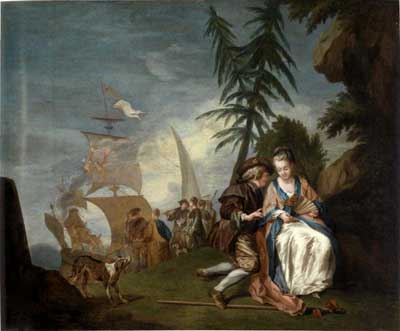
Whereabouts unknown
Oil on canvas
47 x 58.4 cm
ALTERNATIVE TITLES
Ein galantes Paar vor der Einschiffung nach Kythera
PROVENANCE
Vienna, Dorotheum, sale, June 22, 2010, lot 149: “Philippe Mercier . . . zugeschrieben. Ein galantes Paar vor der Einschiffung nach Kythera. Öl auf Leinwand. 47 x 58,4 cm, gerahmt / € 5.000 - 7.000 / US$ 6.400 - 8.900.” Bought in.
REMARKS
The direction of the composition suggests that it was based on the Crépy engraving. Although this is a generally faithful copy of the figural elements, the rocks at the left and the pine trees in the landscape strike a jarring note. They are not to be found in French fêtes galantes and suggest, instead, that the copyist was North European. That the painting first appeared publicly in Vienna perhaps reinforces this idea. The painting certainly has nothing to do with Philippe Mercier.
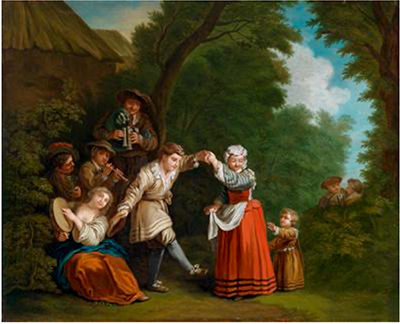
Anonymous copyist after Watteau, Danse champestre, oil on canvas, 47 x 58.4 cm. Whereabouts unknown.
This picture was paired with a copy after Watteau’s La Danse champêtre that was sold as lot 148—a painting with same measurements and also wrongly attributed to Philippe Mercier.
Bon voyage (copy 5)
Entered July 2016; revised April 2021
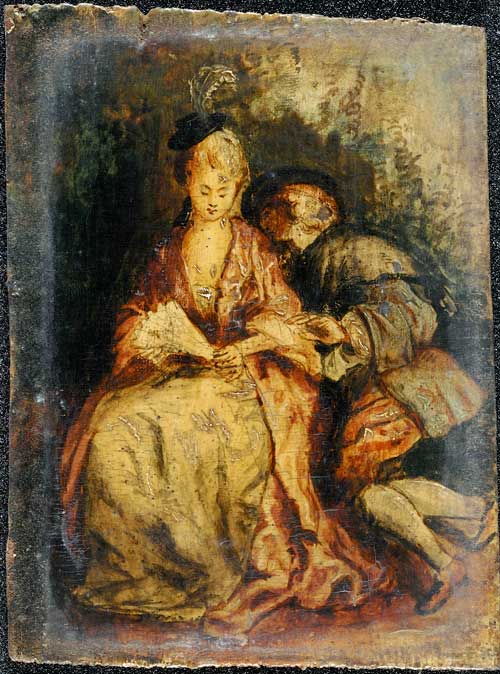
Caen, Musée des beaux-arts, inv. M 416.
Oil on panel
11.4 x 8.5 cm
ALTERNATIVE TITLES
Conversation
Conversation dans un parc
PROVENANCE
Caen, collection of Pierre Philippe Mancelle (baker). This is suggested by the notation on the back of the painting, “fatus panier” (speaking of bread). This may have been written jokingly by Mancel’s son, the next owner of the painting.
Caen, collection of Pierre Bernard Mancel (1798-1872; bookseller); inventory after death, no. 46; donated to the museum in 1872.
EXHIBITIONS
Paris, Musée de la Monnaie, Pèlerinage (1977), cat. 173.
SELECT BIBLIOGRAPHY
Decauville Lachènée, Catalogue des tableaux (1897), cat. 60.
Ménégoz, Catalogue des tableaux (1928), cat. 60.
Debaisieux, Caen, peintures français (2000), cat. 103.
REMARKS
While this painting could be interpreted as a copy of the couple in the foreground of the Louvre or Berlin versions of the Pèlerinage, the fact that it shows just this seated couple makes it likely that it was based on Bon voyage. Moreover, because of the direction of the figures, it seems likely that the copyist was working from the Audran engraving. The perky little brimmed hat worn by the woman, with its large feather cockade, suggests that this copy was not made until the end of the eighteenth century.
The inventory of the Mancel collection drawn up in 1872 after the collector’s death listed the panel as “attribué à Watteau” but, after being transferred to the museum, its attribution was upgraded to Watteau himself. However, most Watteau scholars did not accept this and, in fact, the painting did not appear in any of the twentieth-century literature on Watteau. Within the museum it was considered to be an autograph study by Watteau for the Pèlerinage, but when the panel appeared in the 1977 exhibition in Paris, it was cited, reasonably enough, as a French eighteenth-century copy after Watteau, and it was so listed in the 2000 catalogue of the Caen museum’s collection.
Bon voyage (copy 6)
Entered July 2016; revised April 2021
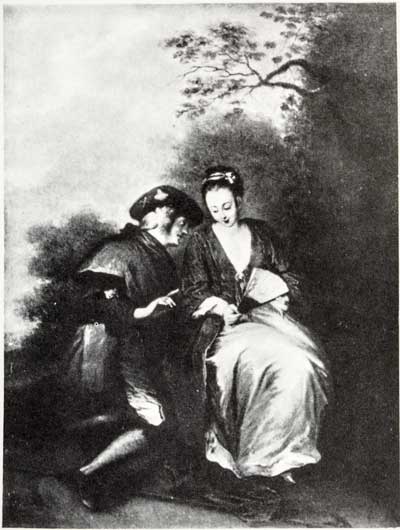
Whereabouts unknown
Oil on panel
26 x 20
ALTERNATIVE TITLES
Un Couple
PROVENANCE
Berlin, sale, Rudolph Lepke Kunst Auktions Haus, November 14, 1911, lot 119: “C. W. E. DIETRICH . . . Liebespaar. Ein junger Mann in Pilgerkleidung macht einer Dame in weissem Atlasgewand und rotem Überworf kniend eine Liebeserklärung. Landschäflicher Hintergrund. Holz. H. 26 cm. B. 20 cm. G-R. Abbildung auf Tafel 32."
SELECT BIBLIOGRAPHY
Ferré, Watteau (1972), cat. P22.
REMARKS
The attribution to Dietrich of a painting after Watteau is expectable in German-speaking lands, just as the same copy might be attributed to Pater in France. Ferré associates this work with derivatives of the Louvre and Berlin Pèlerinages, but he does not link it with Bon voyage.
For Bon voyage, CLICK HERE